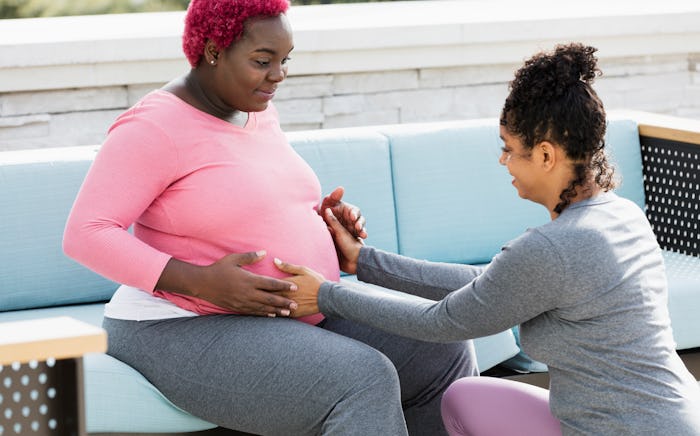Birth

7 Signs Your Baby Has Dropped & Is On The Way
So maybe go ahead and pack that hospital bag.
You’re coming to the end of your pregnancy, and you’ve just about had it with the heartburn and heavy breathing. You’ve been crossing off the days on your calendar, your hospital bag is packed — but how do you know if your body is ready for the main event? One possible sign that you’re getting ready to go into labor is that your baby has dropped, and luckily, there are some signs to look for.
As your third trimester of pregnancy comes to a close, the baby will “drop” lower into the pelvis. Kecia Gaither, director of perinatal services at NYC Health & Hospitals/Lincoln, tells Romper, “‘Baby dropping’ refers specifically to a term called ‘lightening.’ Lightening is an indication that labor will be approaching, in due course, as your baby’s head descends into the pelvis, engaged within the pubic bones.”
Most first-time moms will find that their baby drops somewhere around the last two weeks of their pregnancy, while moms who have delivered previously may not feel it until labor is about to begin since their pelvis was already stretched during that first delivery.
If you’re counting down the days until your little one arrives, you can look for some of these signs that your baby has dropped and that labor may be starting soon. Remember: feeling like your baby has dropped doesn’t necessarily mean they’ll be there the next day, but it’s a pretty good indication that you’re nearing the finish line. Enjoy your last few moments alone on the couch — things are about to get real.
1
You'll Have To Pee Even More Than Usual
Yes, it’s possible for you to feel the urge to urinate even more than you already are (sorry). New York-based OB-GYN Dr. Heather Irobunda (you can find her on TikTok, too) tells Romper that this is because of increased pelvic pressure. “When your baby is positioned lower in your pelvis, that may cause the weight of the uterus — with your growing baby — to be placed on your bladder,” she explains. “This weight decreases the amount of urine your bladder can hold before you start feeling the urge to urinate.”
Gaither adds that this could also lead to more vaginal discharge and potential pelvic pain since “the baby’s head is placing pressure on the pelvic ligaments.”
2
You Might Have Less Heartburn
If you’ve been feeling the burn (literally) of pregnancy, then you might be happy to hear that the baby dropping can relieve some of that heartburn… sometimes, anyway. Irobunda says that some women may experience less heartburn “because the uterus is not pushing up on your small intestines and stomach,” which is normally what causes heartburn during pregnancy.
“However, others may see no change, because one of the main reasons why pregnant people have heartburn is because of slower digestion — or transit time for your food to be digested — which is caused by the increase in progesterone during pregnancy.” That slow digestion still be happening whether your baby has dropped or not.
3
You'll Have An Easier Time Breathing
If you’ve been carrying high (or even if you haven’t), then you’ve likely experienced the fun pregnancy symptom of shortness of breath. When the baby drops, this might allow you to literally breathe a big sigh of relief. “As the baby moves down into the pelvis, it leaves more room for the lungs to expand when breathing,” Irobunda says. This makes breathing much easier.
4
You Might Start walking Differently
Have you suddenly found yourself waddling, almost like you’re imitating a penguin? That could be a sign your little one has dropped. “Some pregnant people may notice that they may ‘waddle’ more when the baby drops,” Irobunda says. “This is because some of the bones of the pelvis and hips may shift in a way that allows the baby more room, but widens your stance.”
Gaither adds that this can also make extended walking more painful because of the increased pressure.
5
Your Bump Will Look Different
Start comparing those bump selfies — you might notice something has changed over the past few weeks. “Your bump may appear lower or may look more like a teardrop as opposed to a ball protruding,” Irobunda explains. That’s because “your baby is now sitting lower in your pelvis.”
6
You Can Eat More Than Usual
One common myth about pregnant women is that they can’t stop eating, especially towards the end, but that’s definitely not always true. In fact, in the third trimester, many women find it hard to eat a lot at once — all of that pressure from the growing baby makes your stomach smaller, so it can’t handle that much food.
But when the baby drops, you might suddenly find that you can eat more without feeling incredibly uncomfortable. “Your baby dropping may make some feel hungrier as there is now more room for your stomach to expand, increasing the capacity that your stomach can hold,” Irobunda says.
7
You’ll Feel Vaginal Discomfort
If you feel pain in the vaginal area, don’t immediately freak out — this could be a result of the lightening process. “When the baby drops, some people may notice some vaginal discomfort, even the sensations of zings or like an electrical zap in their vagina,” Irobunda says. “This is caused by the uterus resting on some nerves in the pelvis. There is no need to worry, it is a normal part of the end stages of pregnancy.”
Experts:
Kecia Gaither, MD, MPH, FACOG, double-board certified in OB-GYN and Maternal Fetal Medicine, Director of Perinatal Services at NYC Health & Hospitals/Lincoln
This article was originally published on